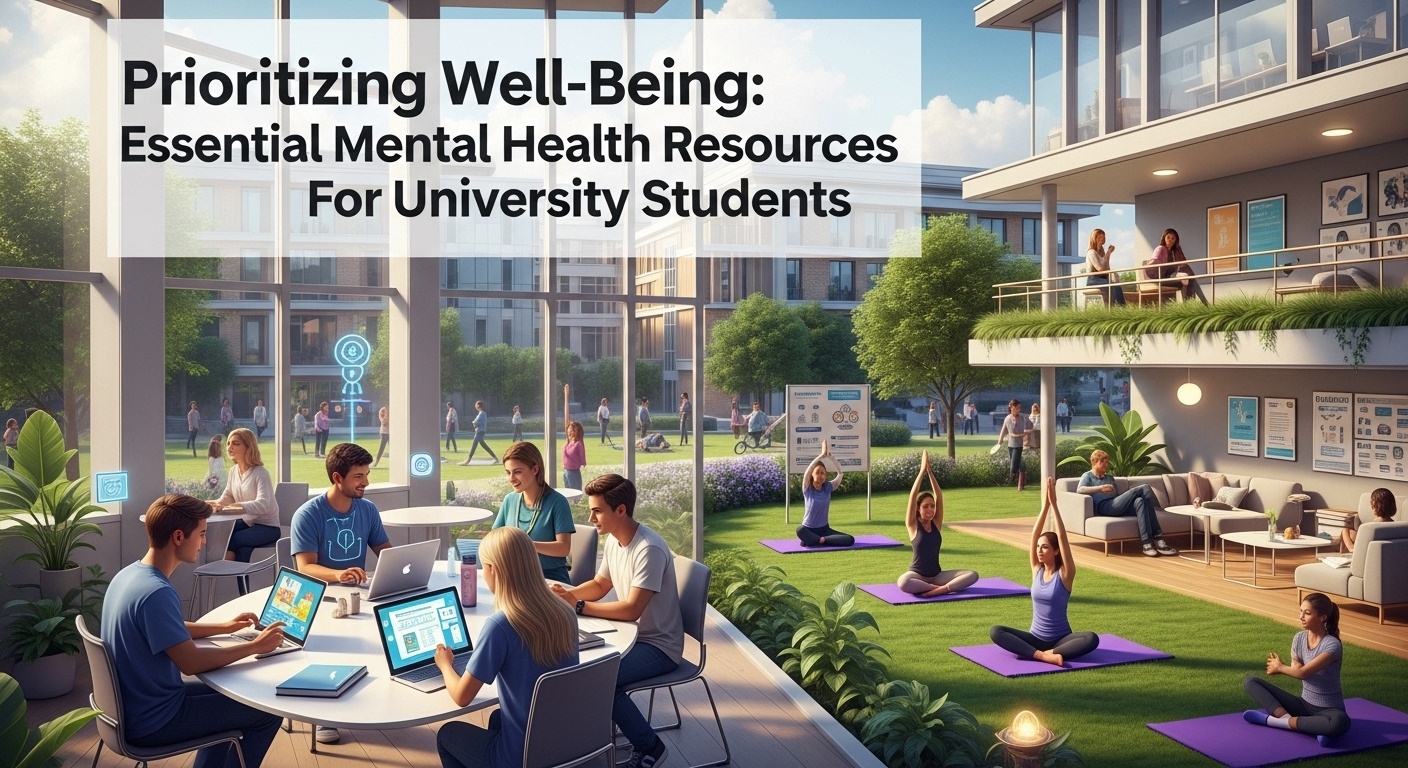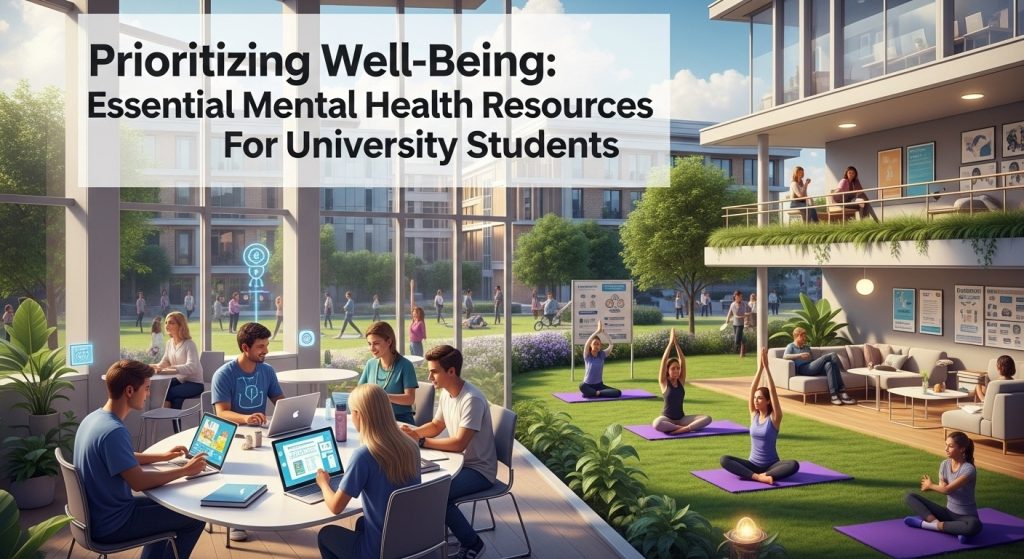University life, while intellectually stimulating, increasingly presents significant challenges to student well-being. A recent study highlights a surge in anxiety and depression amongst undergraduates, exacerbated by factors like financial pressures and social media’s impact on self-esteem. Proactive engagement with mental health resources is no longer optional. Crucial for academic success and personal fulfillment. For instance, leveraging readily available cognitive behavioral therapy (CBT) techniques, often accessible through university counseling services, can equip students with coping mechanisms for managing stress. Moreover, understanding the nuances of on-campus support systems, from peer mentorship programs to crisis intervention protocols, empowers individuals to navigate difficult situations effectively, fostering a resilient and thriving academic community.

Understanding the Unique Mental Health Challenges Faced by University Students
University life, while exciting, presents a unique set of stressors that can significantly impact mental well-being. The transition from a structured home environment to the independence of university, coupled with academic pressures, financial concerns. Social adjustments, can create a perfect storm for mental health challenges.
- Academic Pressure: The pressure to succeed academically, maintain a high GPA. Secure future career prospects can lead to anxiety, stress. Burnout. Course workloads, demanding professors. Competitive environments all contribute to this pressure.
- Financial Strain: Many students face significant financial burdens, including tuition fees, accommodation costs. Living expenses. This financial stress can affect their ability to focus on studies and can lead to feelings of anxiety and depression.
- Social Isolation and Loneliness: Adjusting to a new social environment, making new friends. Navigating complex social dynamics can be challenging. Feelings of loneliness and isolation are common, particularly for students who are far from home or struggle to connect with others.
- Identity Development: University is a time of significant personal growth and identity exploration. Students grapple with questions about their values, beliefs. Future aspirations. This process can be confusing and overwhelming, leading to feelings of uncertainty and anxiety.
- Sleep Deprivation and Poor Lifestyle Habits: The demands of university life often lead to sleep deprivation, unhealthy eating habits. A lack of physical activity. These lifestyle factors can negatively impact mental health and exacerbate existing conditions.
These challenges, if left unaddressed, can contribute to the development of mental health conditions such as anxiety disorders, depression, eating disorders. Substance abuse. Recognizing these unique pressures is the first step in prioritizing well-being and seeking appropriate support.
On-Campus Mental Health Resources: Your First Line of Support
Universities are increasingly recognizing the importance of providing accessible and comprehensive mental health services to their students. These resources are often free or low-cost and are designed to address a wide range of mental health needs. Familiarizing yourself with these resources is crucial for proactively managing your well-being.
- Counseling Centers: Most universities have counseling centers staffed by licensed therapists and counselors. These centers offer individual, group. Couples counseling services. Students can typically access short-term therapy to address issues such as anxiety, depression, stress, relationship problems. Academic difficulties.
- Student Health Services: University health services often provide mental health assessments, medication management. Referrals to off-campus specialists. They can also address the connection between physical and mental health.
- Disability Services: Students with diagnosed mental health conditions, such as anxiety or depression, may be eligible for accommodations through the university’s disability services office. Accommodations can include extended time on exams, reduced course load, or preferential seating.
- Peer Support Programs: Many universities offer peer support programs, where trained student volunteers provide support and guidance to their peers. These programs can offer a safe and confidential space to talk about concerns and connect with others who comprehend.
- Mental Health Workshops and Training: Universities often host workshops and training sessions on topics such as stress management, mindfulness. Suicide prevention. These programs can equip students with valuable skills and knowledge to promote their own well-being and support their peers.
- Residential Life Programs: Resident advisors (RAs) in residence halls are often trained to recognize signs of mental distress and provide support to students. They can also connect students with on-campus resources.
It is crucial to remember that seeking help from on-campus resources is a sign of strength, not weakness. Taking advantage of these services can significantly improve your overall well-being and academic success.
Navigating Teletherapy and Online Mental Health Platforms
Teletherapy, or online therapy, has emerged as a convenient and accessible option for students seeking mental health support. Online platforms offer a variety of services, including video therapy, text-based therapy. Self-guided programs. Benefits of Teletherapy:
- Accessibility: Teletherapy eliminates geographical barriers and allows students to access therapy from anywhere with an internet connection. This is particularly beneficial for students who live in rural areas or have limited mobility.
- Convenience: Online therapy offers flexible scheduling options, allowing students to fit therapy sessions into their busy schedules.
- Affordability: Some online platforms offer more affordable therapy options compared to traditional in-person therapy.
- Reduced Stigma: Some students may feel more comfortable seeking therapy online due to the anonymity and privacy it offers.
Popular Teletherapy Platforms:
- Talkspace: Offers a variety of therapy options, including text-based therapy, video therapy. Psychiatric services.
- BetterHelp: Provides access to licensed therapists through online messaging, phone. Video sessions.
- Amwell: Offers a range of telehealth services, including therapy and psychiatric evaluations.
- MDLive: Provides access to psychiatrists and therapists through online video consultations.
Considerations When Choosing a Teletherapy Platform:
- Therapist Credentials and Licensing: Ensure that the therapists on the platform are licensed and qualified to provide mental health services in your state.
- Privacy and Security: Choose a platform that uses secure communication channels and protects your privacy.
- Cost and Insurance Coverage: Check the platform’s pricing and whether it accepts your insurance.
- Therapy Style and Approach: Consider your preferred therapy style and choose a platform that offers therapists who specialize in that approach.
Teletherapy can be a valuable resource for students who are seeking mental health support but face barriers to accessing traditional in-person therapy. But, it is crucial to research and choose a reputable platform that meets your individual needs and preferences.
Self-Care Strategies: Building a Foundation for Mental Well-being
While professional support is essential, incorporating self-care strategies into your daily routine is crucial for maintaining long-term mental well-being. Self-care involves engaging in activities that promote your physical, emotional. Mental health. Effective Self-Care Strategies:
- Prioritize Sleep: Aim for 7-9 hours of quality sleep each night. Establish a regular sleep schedule and create a relaxing bedtime routine.
- Nourish Your Body: Eat a balanced diet rich in fruits, vegetables. Whole grains. Limit processed foods, sugary drinks. Caffeine.
- Engage in Regular Physical Activity: Aim for at least 30 minutes of moderate-intensity exercise most days of the week. Find activities you enjoy, such as walking, running, swimming, or dancing.
- Practice Mindfulness and Meditation: Mindfulness involves paying attention to the present moment without judgment. Meditation can help reduce stress, improve focus. Promote emotional well-being. There are many free mindfulness apps available, such as Headspace and Calm.
- Connect with Others: Spend time with friends and family who provide support and encouragement. Join clubs or organizations that align with your interests.
- Engage in Hobbies and Activities You Enjoy: Make time for activities that bring you joy and relaxation, such as reading, listening to music, painting, or spending time in nature.
- Set Boundaries: Learn to say “no” to commitments that overwhelm you. Protect your time and energy by setting clear boundaries with others.
- Practice Gratitude: Take time each day to reflect on the things you are grateful for. This can help shift your focus from negative to positive emotions.
- Limit Social Media Use: Excessive social media use can contribute to feelings of anxiety, depression. Social comparison. Set limits on your social media use and be mindful of the content you consume.
Self-care is not selfish; it is essential for maintaining your mental and physical health. By incorporating these strategies into your daily routine, you can build a strong foundation for well-being and resilience.
The Role of Technology: Apps and Digital Tools for Mental Health Management
Technology offers a range of apps and digital tools that can support mental health management. These tools can provide access to self-help resources, track mood and symptoms. Connect you with support networks. Popular Mental Health Apps:
- Headspace: A meditation and mindfulness app that offers guided meditations, sleep stories. Breathing exercises.
- Calm: Another popular meditation app that provides guided meditations, relaxing music. Nature sounds.
- Moodpath: A mental health assessment and tracking app that helps you identify and monitor symptoms of depression and anxiety.
- Day One: A journaling app that allows you to record your thoughts, feelings. Experiences.
- Insight Timer: A free meditation app with a vast library of guided meditations and talks from various teachers.
- Sanvello: An app that offers cognitive behavioral therapy (CBT) techniques, mood tracking. Peer support.
How to Use Mental Health Apps Effectively:
- Choose Apps Based on Your Needs: Consider your specific mental health goals and choose apps that align with those goals.
- Use Apps Consistently: To see results, use the apps regularly and integrate them into your daily routine.
- Be Mindful of Data Privacy: Review the app’s privacy policy and ensure that your data is protected.
- Don’t Replace Professional Help: Mental health apps are not a substitute for professional therapy or medical treatment. If you are struggling with a serious mental health condition, seek help from a qualified healthcare provider.
Technology can be a valuable tool for managing your mental health. It is essential to use it responsibly and in conjunction with other support resources.
Building a Supportive Community: The Power of Peer Support and Connection
Connecting with others and building a supportive community is essential for mental well-being. Peer support can provide a sense of belonging, reduce feelings of isolation. Offer valuable emotional support. Ways to Build a Supportive Community:
- Join Clubs and Organizations: Participate in activities that align with your interests and connect you with like-minded individuals.
- Attend Social Events: Attend campus events, parties. Gatherings to meet new people and build relationships.
- Connect with Classmates: Reach out to classmates and form study groups. This can provide academic support and social connection.
- Volunteer: Volunteering can help you connect with others, make a difference in your community. Boost your self-esteem.
- Utilize Online Communities: Join online forums and social media groups related to your interests or mental health concerns.
- Be Open and Honest with Friends and Family: Share your feelings and experiences with trusted friends and family members. Let them know how they can support you.
- Seek Out Mentors: Connect with mentors who can provide guidance and support as you navigate university life.
The Benefits of Peer Support:
- Reduced Feelings of Isolation: Connecting with others who comprehend your experiences can reduce feelings of loneliness and isolation.
- Increased Self-Esteem: Supporting others and receiving support in return can boost your self-esteem and confidence.
- Improved Coping Skills: Sharing coping strategies with peers can help you develop more effective ways to manage stress and challenges.
- Sense of Belonging: Being part of a supportive community can provide a sense of belonging and connection.
- Reduced Stigma: Talking openly about mental health with peers can help reduce stigma and encourage others to seek help when needed.
Building a supportive community takes time and effort. It is an investment in your mental well-being. By connecting with others and fostering meaningful relationships, you can create a strong network of support that will help you thrive throughout your university journey. Enrolling in a course that encourages group activities can also help build these connections.
Conclusion
University life is a transformative journey. It’s crucial to remember that academic success isn’t the only measure of well-being. Proactively utilizing the mental health resources available, like counseling services and peer support groups, can make a significant difference. I personally found that scheduling even just 30 minutes each week for mindfulness or a hobby, like visiting a local park near campus, drastically reduced my stress levels during exam periods. Beyond the immediate support systems, remember the power of community. Universities are increasingly recognizing the importance of fostering inclusive environments, so seek out clubs or organizations that align with your interests. Don’t hesitate to reach out to professors or mentors, as they often have valuable insights and can offer guidance. Taking charge of your mental health isn’t a sign of weakness. Rather an act of strength and self-awareness that will serve you well throughout your academic career and beyond. You’ve got this! Remember there are resources available to help you succeed. Find Help Here
More Articles
Crafting Your Success Story: Writing a Powerful Personal Statement for UK Universities
Funding Your Future: Business Management Degree Scholarships and Grants
Biotech Careers in 2025: Exploring Paths, Skills. Future Opportunities
Online vs. In-Person Computer Science Degree: Which Path is Best?
FAQs
Okay, so I’m feeling stressed. But like, everyone’s stressed in college. How do I know if it’s just ‘normal college stress’ or something I should actually get help with?
That’s a super valid question! It’s true, college is stressful. But if your stress is consistently impacting your sleep, eating habits, ability to focus, or your overall mood for more than a couple of weeks, that’s a good indicator it’s more than just the usual pressure. Trust your gut – if something feels off, it’s worth checking in with someone.
What kind of mental health resources are even available at university, anyway? I’m not sure where to start looking.
Most universities offer a range of services. Think on-campus counseling centers (often free or low-cost), support groups, workshops on stress management and mindfulness. Sometimes even psychiatric services. Your student health center website is usually the best place to start digging for info.
I’m a little nervous about going to the counseling center. What if someone I know sees me? Is everything confidential?
Totally understandable! Privacy is a big concern. Generally, what you discuss with a counselor is confidential, meaning they can’t share it with anyone without your permission (with a few exceptions, like if you’re a danger to yourself or others, which they’ll explain upfront). Counseling centers are used by tons of students, so chances are, even if you do see someone you know, they’re probably there for the same reason you are!
What if the on-campus resources aren’t a good fit for me? Are there other options?
Absolutely! Many universities have partnerships with off-campus therapists and mental health professionals. Your counseling center can usually provide referrals. You can also look into online therapy platforms, which can be more convenient and sometimes more affordable. Don’t be afraid to shop around until you find someone you click with.
Besides formal therapy, are there any quick and easy things I can do to boost my mental well-being on a daily basis?
Definitely! Little things can make a big difference. Try to incorporate regular exercise (even a short walk!) , prioritize sleep, connect with friends and family, practice mindfulness or meditation (there are great apps for that!). Make time for hobbies you enjoy. Even small acts of self-care can add up.
I’m worried about a friend. How can I help them without making things worse?
That’s really kind of you. The best thing you can do is listen without judgment and let them know you’re there for them. Encourage them to seek professional help and offer to go with them to the counseling center if they feel comfortable. Avoid giving advice or trying to fix their problems – just be a supportive friend.
Is seeking help for mental health considered a sign of weakness at university?
Absolutely not! In fact, it’s a sign of strength and self-awareness. Recognizing you need support and taking steps to get it is incredibly brave. Many students seek help. It’s becoming increasingly normalized. Don’t let stigma hold you back from prioritizing your well-being.



